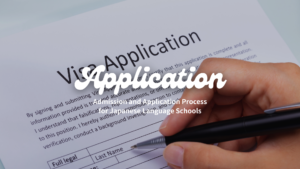Learn how to apply to Japanese language schools in Japan. Step-by-step guidance on requirements, documents, COE and student visa procedures for long-term study.
Want to learn Japanese in Japan? Ask any questions!
Apply with Travelife Japan to receive personalized guidance, application support, and a smoother enrollment experience.
Steps to Apply Japanese Language School
Contact us and get support from us for FREE. Check the school information and requirements together for the application. 8-12 months before.
Complete the application documents and apply for the school. Pay the application fee. 8-12 months before.
After passing the documents screening, interview with the school and submit the COE. 5-7 months before.
Upon the approval of COE and acceptance of enrollment, make the payment of fees including tuition and accommodation. 1-3 months before.
With the COE documents, apply for visa at the embassy/consulate-general of Japan in your country. 1 months before.
Get a flight ticket and insurance. Prepare daily essentials for you to explore your story in Japan. Please also check below and join our community.
School Admission Requirements
Eligibility Requirements for Applicants
Applicants must be at least 18 years old and have completed 12 years of formal education, including elementary school, to be eligible for admission to Japanese language schools. Depending on the applicant’s nationality, proof of Japanese language proficiency, such as a JLPT N5 certificate or evidence of 150 hours of Japanese language study, may be required. The application process involves submitting several documents, including passport photographs, a copy of the passport, academic transcripts or certificates, and an essay explaining the motivation for studying in Japan. The application periods for enrollments typically occur four times a year, corresponding to the April, July, October, and January intake periods. Applicants from OECD countries generally face a more streamlined documentation process, while those from non-OECD countries might need to provide additional documentation like a birth certificate and proof of financial capability.
Application Documents
Document requirements can differ based on personal situations, with potential requests for extra paperwork. All original documents need a Japanese translation, for which you can seek help from your school. Typically, papers from academic or public bodies should be up-to-date, preferably issued in the last three months.
Documents Required from the Applicant
- Completed School Application Form
Applicants are required to fill out and submit the school’s specific enrollment application. - Final Education Certificate
This includes either a graduation certificate or a degree from the most recent school or college attended. Applicants currently in school should provide a certificate of enrollment. - Latest Academic Transcript
A transcript from the most recent educational institution the applicant has attended. - Recent Photographs
Six to eight photographs sized 3cm by 4cm, taken within the past three months, with one photo to be attached to the enrollment application. - Family Register Copy
A copy of the applicant’s family register. - Proof of Employment
A certificate issued by the employer, necessary only for applicants who have work experience. - Passport Copy
Required for applicants with a valid passport. Those who have visited Japan before need to include copies of the passport pages showing Japanese entry visas. - Japanese Language Proficiency Evidence
Relevant only for applicants possessing such documentation, like results or score reports from Japanese language exams (e.g., EJU, JLPT, JPT).
Documents Required from the Sponsor
A. When the Sponsor is in Japan:
- Letter of Support to the Minister of Justice with a registered seal or signature.
- Employment certificate or business registration certificate.
- Tax payment certificates.
- Resident register or alien registration card for foreign residents in Japan.
- Seal registration certificate.
- Proof of relationship with the applicant (e.g., family register, birth certificate).
- Bank and Income statements in the sponsor’s name, in JPY or USD. It is suggested to have at least JPY 2,000,000 – 3,000,000.
B. When the Sponsor is Outside Japan:
- Letter of Support to the Minister of Justice with a registered seal or signature.
- Employment or business registration certificate.
- Proof of relationship with the applicant (e.g., family register, birth certificate).
- Tax payment certificate showing earnings/income over the past three years.
- Bank and Income statements in the sponsor’s name, in JPY or USD. It is suggested to have at least JPY 2,000,000 – 3,000,000.
C. When the Applicant is Self-Financing:
- Bank statement in the applicant’s name, in JPY or USD. It is suggested to have at least JPY 2,000,000 – 3,000,000.
- Documentation showing annual income.

Student Visa Application Process
Selecting the right school is crucial and should be based on factors like teaching style, course offerings, and location. After completing the school application and submitting all required documents, the school applies for a Certificate of Eligibility (COE) on the student’s behalf, which typically takes 2-3 months to process. Once the COE is granted, the student can then apply for a student visa at the nearest Japanese embassy or consulate, providing the COE, a valid passport, and other necessary documents.
Start with filling out the school’s application form thoroughly. Then, submit all necessary documents as previously mentioned, which encompass academic certificates, transcripts, photographs, and any other required paperwork. This step is crucial for a successful application process.
After receiving your documents, our team and school will review them. If additional information is required or corrections are needed, we will guide you through this process.
The school will then forward your application and supporting documents to the immigration authorities for the issuance of the Certificate of Eligibility (COE).
The COE approval process by immigration typically takes about 2-3 months. Be aware that applications can be rejected for various reasons, such as falsified documents, incorrect application details, inaccurate educational history, or insufficient financial backing from the sponsor.
Once the COE is approved (usually 5-6 weeks before the course starts), the school will send you a copy of your COE, an invoice for tuition (and any other requested fees), and an acceptance letter. It’s crucial to make the payment by the due date to receive the original COE via mail.
With the original COE in hand, the final step is to apply for your student visa at the nearest Japanese embassy in your country. For the student visa application, you will need to submit:
- The original COE.
- The acceptance letter from the school.
- A valid passport.
- A recent passport-sized photo taken within the last six months
- The completed student visa application form.
Preparing for Life in Japan
Prior to departure, students should ensure they have adequate health insurance coverage for their stay in Japan and should secure their accommodation in advance, with options including dormitories, apartments, or homestay. Upon arrival in Japan, students need to present their student visa to immigration officials to receive a residence card, and must register at their local city hall within 14 days to obtain a health insurance card. Setting up a local mobile phone plan and opening a bank account, which may require a personal seal (Hanko/Inkan), are also essential steps.
Health and Insurance
Before embarking on your journey to Japan, securing comprehensive health insurance is essential, as healthcare in Japan can be expensive and having adequate coverage is a requirement for most students. Familiarizing yourself with the Japanese healthcare system, including how to access medical services, is an important step in your preparation.

Accommodation
Securing your accommodation well before your arrival is crucial. You have various options such as student dormitories, shared apartments, private apartments, and homestay programs, each offering distinct experiences. Learning about Japanese housing etiquette, like removing shoes indoors and understanding local waste disposal rules, will help you adapt to your new living environment more smoothly.

Resident Registration
Foreign nationals staying in Japan for over three months must register their residence at the local city/ward office within 14 days of settling down. For this, you need to submit your passport and, if received, your original Residence Card. If you haven’t gotten your Residence Card at the airport, it will be mailed to your registered address within 1-2 weeks after registration. It’s recommended to get a copy of your certificate of residence during registration, as it’s essential for opening a bank account and setting up a mobile phone contract if your Residence Card is not yet issued.
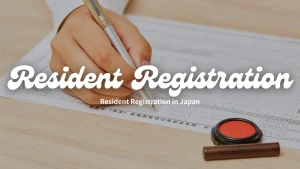
My Number Card
Since October 2015, Japan has implemented the “My Number” system, a 12-digit personal number assigned to individuals, including foreign nationals residing in Japan for over three months. This number, also known as your Individual Number, is primarily used for social security, taxation, and disaster response purposes. Once registered as a resident, you’ll receive a notification card with your Individual Number from your local city/ward office. This number is crucial for various official procedures related to pensions, medical insurance, and taxes. It’s important to keep this number secure, even after leaving Japan, due to its significance in administrative matters.
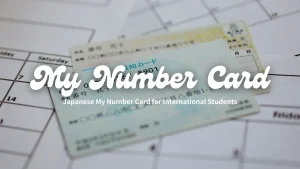
Public Pension System
In Japan, residents aged 20 to 59, including foreign nationals with a residence card, must enroll in the public pension system, comprising the National Pension System and the Employees’ Pension Insurance System. Enrollment is done at the local city/ward office or Japan Pension Service branch. If you are 20 or older upon entering Japan, enroll after completing resident registration. Those under 20 will be prompted to enroll when they approach their 20th birthday. Students and individuals with financial difficulties can apply for contribution postponement or exemption. These applications, especially for students, often require annual renewal, and eligibility depends on income levels from previous years.
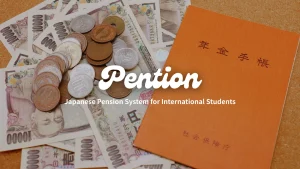
WiFi and SIM Card Rental
Securing a local SIM card or mobile plan is a priority for international students in Japan, ensuring vital connectivity. Providers such as Mobal, Ninja Wi-Fi, and Sakura Mobile specialize in services for foreigners, offering versatile plans including data-only and combined voice and data packages. These plans often come with the advantage of short-term contracts, perfectly suited for student life. Additionally, the availability of English support from these providers significantly simplifies the setup process, making staying connected in Japan hassle-free and convenient for international students.
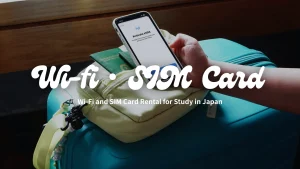
Banking
For international students in Japan, opening a local bank account is crucial for financial management. Essential documents typically include your residence card and possibly a personal seal. Among the banking options, Shinsei Bank stands out for its foreigner-friendly services, offering English support and requiring only a passport and residence card for account setup. Japan Post Bank is another excellent choice, celebrated for its ubiquity and ease of access, with branches and ATMs in post offices nationwide. Both institutions cater specifically to the needs of international students, providing a seamless and accessible banking experience essential for navigating life in Japan effectively and efficiently.
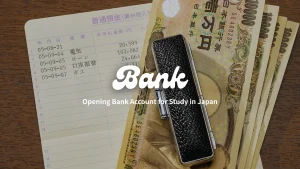
Transportation
Mastering Japan’s public transport is crucial, with trains and subways as the backbone, particularly in cities like Tokyo and Osaka. Use English-friendly ticket machines or get rechargeable Suica or Pasmo cards for ease. Buses, vital for reaching less accessible areas or city-to-city travel, accept cash or smart cards.

Managing Finances
Navigating Japan’s cost of living demands careful financial planning, including for housing, meals, transport, and miscellaneous expenses. International students, if visa conditions allow, can mitigate expenses through part-time employment, adhering to a legal cap of 28 hours weekly during term and 40 in holidays. Securing a work permit from immigration is straightforward. Popular job options include hospitality and tutoring, offering flexible schedules. Besides economic relief, these roles enhance cultural engagement and language skills, enriching the study abroad experience.

Maintaining Good Attendance Rate
For international students in Japan, maintaining an attendance rate of over 80% is crucial. Falling below 79% without a valid reason can hinder visa renewal, and dropping below 59% may make renewal impossible. Most schools enforce this attendance requirement strictly. This emphasizes the importance of regular attendance for academic success and compliance with visa regulations in Japan. Adhering to these standards is essential for international students aiming to make the most of their educational opportunities in this culturally rich country.

Post-Study Opportunities
Post-Graduation Planning
After completing language school, students may consider enrolling in universities or vocational colleges for further education or specialized training. Those planning to stay in Japan can start exploring job opportunities for transitioning from a student to a work visa. It is important for students to stay informed about their rights as international students in Japan and to adhere strictly to Japanese laws and regulations.
Residence Status after Graduation
Your student visa remains valid until its expiry or the completion of your study program, with a maximum post-study stay of 3 months. For post-graduation travel, visit the local immigration office to transition to a short-term visa or visa waiver, depending on your nationality. Schools typically advise departing within a month of graduation. This guidance ensures you’re informed about managing your residence status after completing your studies in Japan, facilitating a smooth transition to your next journey.

Conclusion
Wrapping up our comprehensive guide to studying at a Japanese language school in Japan, it’s evident that this venture is much more than an academic pursuit. It’s a journey into the heart of a rich culture, offering a blend of rigorous language training and cultural immersion. As you prepare for this life-changing experience, remember that success lies in careful planning and a deep understanding of the necessary procedures. This guide is your roadmap to navigating this exciting path. Embrace this opportunity to grow and explore in the vibrant and dynamic setting of Japan, enhancing your understanding of the world and yourself.
CONTACT US
For studying Japanese in Japan, please contact us.

